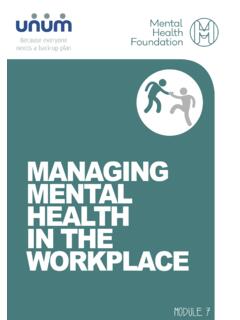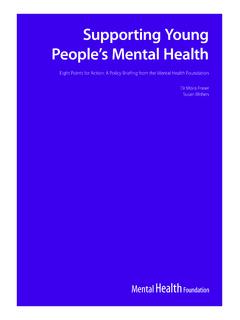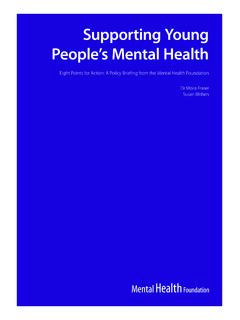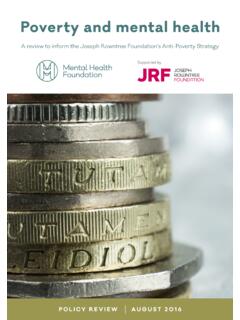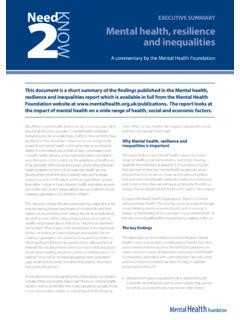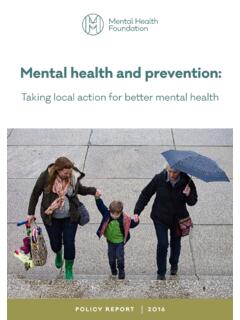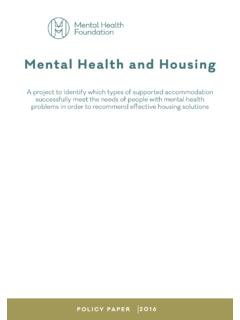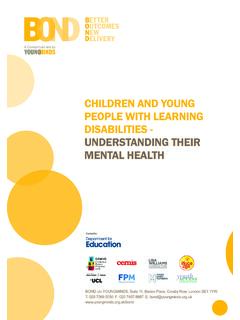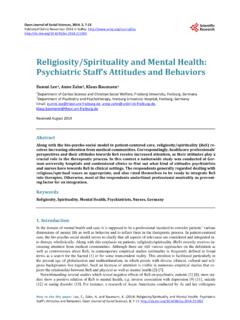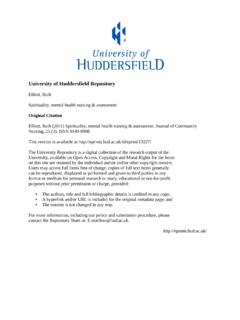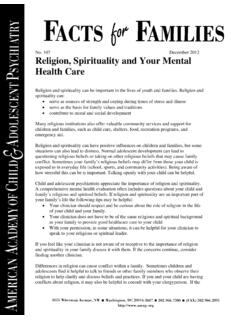Transcription of The impact of spirituality on mental health
1 The impact of spiritualityon mental healthIn the past decade or so, researchers across a range of disciplines have started to explore and acknowledge the positive contribution spirituality can make to mental health . Service users and survivors have also identified the ways in which spiritual activity can contribute to mental health and wellbeing, mental illness and review of the literature Acknowledgments This report was written by Dr Deborah Cornah on behalf of the mental health Foundation. Research supervision was provided by Iain Ryrie, Director of mental health Research. The Foundation is grateful to Mary Ellen Coyte, Graeme Sandell and Dr Andrew McCulloch for their comments. The impact of spirituality upon mental health Contents Executive Summary 21.
2 Background 6 Definitions of spirituality 6 spirituality and mental health 7 Aims of report 82. Consequences of spiritual activity for mental health 9 spirituality and depression 10 spirituality and anxiety 12 spirituality and PTSD 14 spirituality and schizophrenia 15 spirituality and suffering 163. Factors mediating the relationship between spirituality and mental health 18 Coping styles 18 Locus of control / attributions 20 Social support 21 Physiological impact 22 Architecture and the built environment 234. Limitations of the research 25 Over-reliance on quantitative research 25 Lack of distinction between religion and spirituality 26 Population biases 26 Divine intervention? 275.
3 Implications and Recommendations 28 For Practice 28 For Research 306. Conclusion 327. Further information and support 338. References 34 Contents 1 The impact of spirituality upon mental healthExecutive SummaryBackgroundIn the past decade or so, researchers across a range of disciplines have started to explore and acknowledge the positive contribution spirituality can make to mental health . Service users and survivors have also identified the ways in which spiritual activity can contribute to mental health and wellbeing, mental illness and recovery. This report reviews the evidence and explores the impact that some expressions of spirituality can have as part of an integrative approach to understanding mental health and health problemsAnecdotal, quantitative and qualitative evidence all point to a positive (although often modest) relationship between spirituality and mental health in relation to a number of mental health is the most common mental health problem in the UK and has been the focus of much of the research exploring the relationship between spirituality and mental health .
4 The evidence shows a positive association between church attendance and lower levels of depression amongst adults, children and young people. It also shows that belief in a transcendent being is associated with reduced depressive research has examined the relationship between spirituality and anxiety or stress. Quantitative research demonstrates reduced levels of anxiety in a number of populations, including medical patients in later life, women with breast cancer, middle aged people with cardiac problems and those recovering from spinal surgery. Qualitative research also demonstrates that yoga and meditation are also associated with improvements in mental health and reductions in is an emerging literature examining the association between spirituality and post-traumatic stress disorder (PTSD).
5 One review found 11 studies that reported links between religion, spirituality , and trauma-based mental health problems. A review of these 11 studies produced three main findings. First, these studies show that religion and spirituality are usually, although not always, beneficial to people in dealing with the aftermath of trauma. Second, they show that traumatic experiences can lead to a deepening of religion or spirituality . Third, that positive religious coping, religious openness, readiness to face existential questions, religious participation, and intrinsic religiousness are typically associated with improved post-traumatic , the evidence exploring spirituality with schizophrenia is also relatively scarce. However, one review of the literature concluded that religion plays a central role in the processes of reconstructing a sense of self and recovery.
6 Another found that for individuals who share the same religious values as their family, religiosity can be a cohesive and supporting factor. Others have found that people with a diagnosis of schizophrenia find hope, meaning and comfort in spiritual beliefs and summary2 The impact of spirituality upon mental health Executive summaryNot all research exploring the association of spiritual or religious activity and anxiety shows a beneficial effect of the former on the latter. Rather, it seems to depend to some extent on the way in which spirituality is expressed. For example, increased mental health problems are often found amongst those with a strict religious also find that their religious or spiritual beliefs are not understood or explored within mental health services.
7 For many, clinicians either ignore an individual s spiritual life completely or treat their spiritual experiences as nothing more than manifestations of of the research exploring the association between spirituality and mental health attempts to understand the mechanisms through which potential benefits may occur. Mechanisms most often discussed are:coping styleslocus of controlsocial support and social networksphysiological mechanisms, andarchitecture and the built environmentFindings show that a collaborative approach to religious coping ( the individual collaborates with God in coping with stress) is associated with the greatest improvement in mental , perceiving negative events as externally caused and positive events as internally caused is widely regarded as an optimistic attributional style and is generally associated with better mental health .
8 One review of the literature has suggested that religious beliefs may allow a person to reframe or reinterpret events that are seen as uncontrollable, in such a way as to make them less stressful or more support individuals derive from the members, leaders and clergy of religious congregations is widely considered one of the key mediators between spirituality and mental health . As with other forms of social support, spiritual or religious support can be a valuable source of self-esteem, information, companionship and practical help that enables people to cope with stress and negative life events or exerts its own main researchers have argued that certain expressions or elements of spirituality may positively affect various physiological mechanisms involved in health .
9 Emotions encouraged in many spiritual traditions, including hope, contentment, love and forgiveness, may serve the individual by affecting the neural pathways that connect to the endocrine and immune final mechanism that may mediate the relationship between spirituality and mental health is the environment. As well as specific spiritual buildings and architecture such as churches, temples or mosques nature, art and music may all have an impact upon mental health . 3 The impact of spirituality upon mental healthIn short, the proposed benefits of the association are probably the result of a collection of inter-related and interacting factors, some of which have been addressed in the literature and some of which may yet need to be discovered.
10 These may well interact with a number of individual factors, including a person s pre-existing mental health status, their age, their gender or their cultural background. LimitationsAlthough the evidence generally supports the notion that spirituality is beneficial for mental health , the research does have of the key shortcomings in the field is that it relies almost exclusively on quantitative measures, which may not fully access the meaning spiritual activity has for the individual. Quantitative research tends to try and isolate the impact of one activity ( church attendance) upon another ( level of depression), which may not always capture the rich and complex interactions of other factors on any association further methodological limitation of the research is that it focuses on the effects of spirituality on mental health problems.
